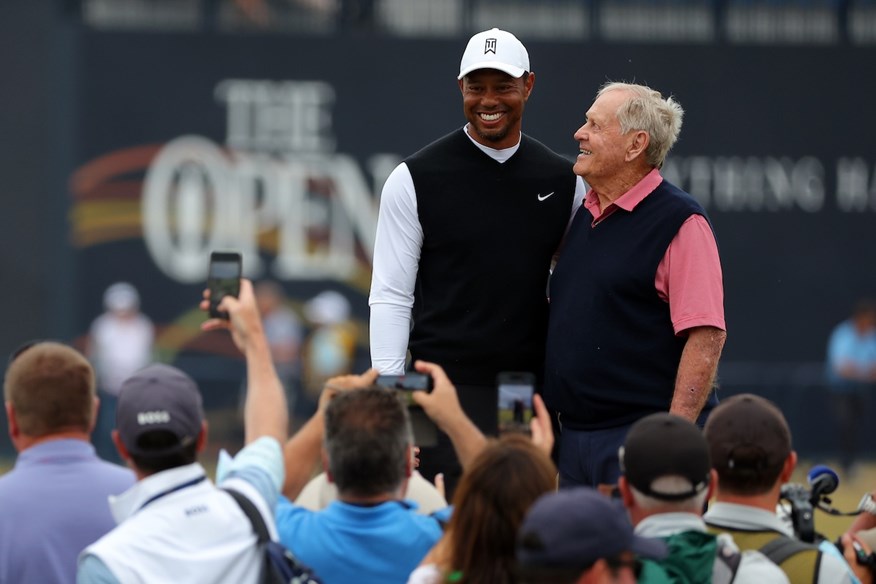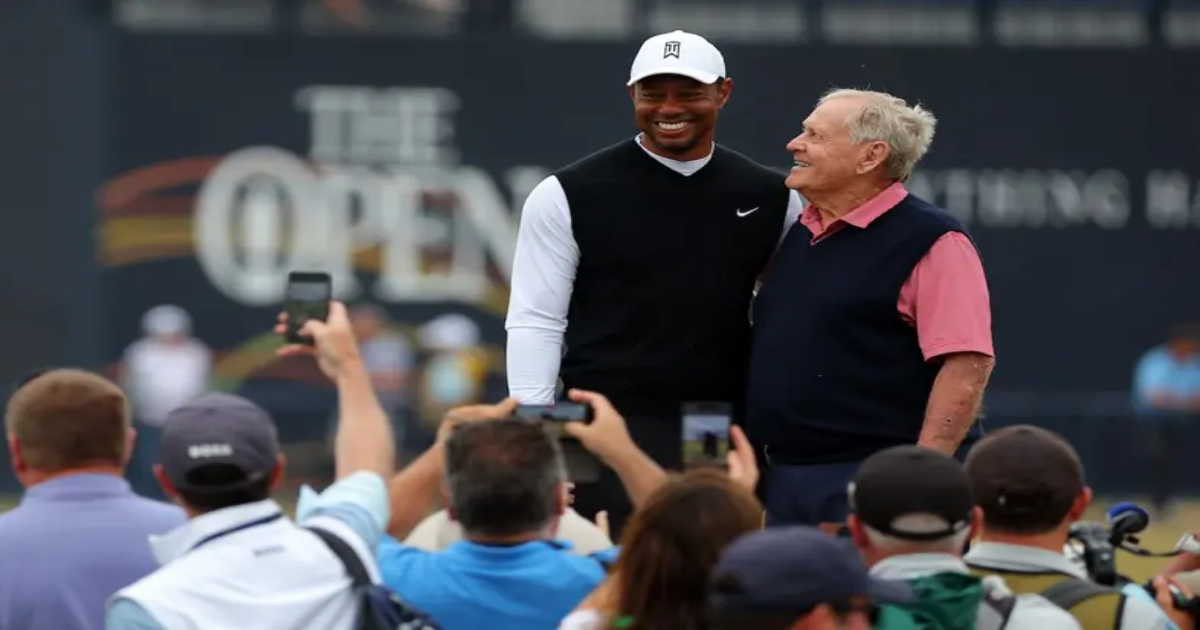
With the Masters yet to be founded, and the PGA Championship open to only professional players, the Grand Slam in the early 20th century was considered to be the four biggest tournaments available to pros and amateurs alike: The Open, US Open, The Amateur, and US Amateur.
Bobby Jones, who would go on to found Augusta National and its invitational tournament, was the only player to achieve this feat.
We might know the period from the first Masters in 1934 to the present day as the modern era of major championships, but that wasn’t always the case. For a number of years, The Open and PGA Championship overlapped, while trans-Atlantic travel was nowhere near as straightforward as it is today, meaning players rarely competed in all four.
In his autobiography, A Golfer’s Life, Arnold Palmer takes credit for the imagining of the new Grand Slam era.
In 1960, Palmer and his friend, Bob Drum, a Pittsburgh Press journalist, were en route to The Open in St Andrews when they came up with the idea. Palmer had already won that year’s Masters and US Open to take his major tally to three, and he decided that if he won the Claret Jug followed by the PGA Championship in those coming weeks, it would constitute a Grand Slam.
However, an article in the Daily News from New York from the day after Palmer’s second Green Jacket victory was headlined: “Biggest Grand Slam May Be Palmer Goal”. That article stated that “Arnold Palmer, the Midas of the fairways, has charted a course which could carry him to the biggest grand slam in golf since Bobby Jones’ feat in 1930.”
It continued: “The Pennsylvania strongman with golfdom’s golden touch passed his first landmark when he won the 24th Masters tournament yesterday with a pulsating stretch drive. Three more big ones remain – the US Open in Denver June 16-18, the 100th anniversary British Open at historic St. Andrews July 4-9, and the PGA championship in Akron, Ohio, July 28-31. If the 29-year-old Palmer can add those three jewels to his Masters crown the performance will rank on a par with Jones’ Grand Slam year.”
By this point, the PGA Championship had switched from a match play format to stroke play and had shifted to August to avoid a clash with golf’s oldest major, while air travel was more commonplace.
Whoever came up with the idea first, the modern-day Grand Slam of the Masters, US Open, The Open, and PGA Championship was born.
While Jones was the only player to win the original Grand Slam, five players have won the modern version.
Gene Sarazen won the second playing of the Masters – then known as the Augusta National Invitation Tournament – to complete the Grand Slam some 25 years before the term was coined.
Ben Hogan was next, completing his Grand Slam at the 1953 Open. He also won the Masters and US Open that year, and to this day remains the only player to win those three tournaments in the same season.
Gary Player became the third player to win the Grand Slam when he lifted the 1965 US Open to go with his 1959 Open, 1961 Masters, and 1962 PGA Championship titles. He would go on to five more.
A little more than a year later, Jack Nicklaus won The Open for the first time to complete his Grand Slam. Nicklaus would go on to win the Grand Slam on three separate occasions.
The remarkable three-peat was matched by Tiger Woods, who became the fifth player to join the Grand Slam club with victory at the 2000 Open at St Andrews.
None of them, though, were able to match Jones’ effort of winning all four majors in the same calendar year.
Woods, though, did win the US Open, Open and PGA Championship in 2000 and the Masters in 2001 to become the first player to hold all four major titles at the same time. They called it the ‘Tiger Slam’.
The original Grand Slam
PLAYERMAJOR WINSGRAND SLAMSUS AMATEURUS OPENTHE OPENTHE AMATEURBobby Jones13151924192519271928
1930
4192319261929
1930
319261927
1930
1
1930
The modern Grand Slam
PLAYERMAJOR WINSGRAND SLAMSMASTERSUS OPENTHE OPENPGA CHAMPIONSHIPJack Nicklaus 18 3619631965196619721975
1986
4196219671972
1980
319661970
1978
51963197119731975
1980
Tiger Woods15 351997200120022005
2019
320002002
2008
320002005
2006
4199920002006
2007
Ben Hogan9121951
1953
4194819501951
1953
1
195321946
1948
Gary Player91319611974
1978
1
1965319591968
1974
21962
1972
Gene Sarazen 711
193521922
1932
1
1932319221923
1933
Good question! Despite claiming to coin the phrase, The King never actually won the Grand Slam…
Twelve players have won three of golf’s four men’s majors – with three of them still active.
Tommy Armour
Won: PGA Championship (1920); US Open (1927); The Open (1931)
Missing: Masters (Best finish: T8 – 1937)
Jim Barnes
Won: PGA Championship (1916, 1919); US Open (1921); The Open (1925)
Missing: Masters (DNP)
Raymond Floyd
Won: PGA Championship (1969, 1982); Masters (1976); US Open (1986)
Missing: The Open (Best finish: T2 – 1978)
Walter Hagen
Won: US Open (1914, 1919); PGA Championship (1921, 1924, 1925, 1926, 1927); The Open (1922, 1924, 1928, 1929)
Missing: Masters (Best finish: T11 – 1936)
Byron Nelson
Won: Masters (1937, 1942); US Open (1939); PGA Championship (1940, 1945)
Missing: The Open (Best finish: 5th – 1937)
Rory McIlroy
Won: US Open (2011); PGA Championship (2012, 2014); The Open (2014)
Missing: Masters (Best finish: 2nd – 2022)
Phil Mickelson
Won: Masters (2004, 2006, 2010); PGA Championship (2005, 2021); The Open (2013)
Missing: US Open (Best finish: 2nd/T2 – 1999, 2002, 2004, 2006, 2009, 2013)
Arnold Palmer
Won: Masters (1958, 1960, 1962, 1964); US Open (1960); The Open (1961, 1962)
Missing: PGA Championship (Best finish: T2 – 1964, 1968, 1970)
Sam Snead
Won: PGA Championship (1942, 1949, 1951); The Open (1946); Masters (1949, 1952, 1954)
Missing: US Open (Best finish: 2nd/T2 – 1937, 1947, 1949, 1953)
Jordan Spieth
Won: Masters (2015); US Open (2015); The Open (2017)
Missing: PGA Championship (Best finish: 2nd – 2015)
Lee Trevino
Won: US Open (1968, 1971); The Open (1971, 1972); PGA Championship (1974, 1984)
Missing: Masters (Best finish: T10 – 1975, 1985)
Tom WatsonWon: The Open (1975, 1977, 1980, 1982, 1983); Masters (1977, 1981); US Open (1982)
Missing: PGA Championship (Best finish: T2 – 1978)
It’s slightly more complicated in the women’s game, as the majors have chopped and changed over the years. There are currently five, though some years have seen as few as two played.
It is generally considered that any golfer with four different major championships is considered a Grand Slam champion, which means there are currently seven LPGA legends in the club.
They are:
Louise Suggs
Western Open, Titleholders Championship, Women’s PGA Championship, US Women’s Open
Mickey Wright
Western Open, Titleholders Championship, Women’s PGA Championship, US Women’s Open
Pat Bradley
Chevron Championship, Women’s PGA Championship, US Women’s Open, de Maurier Classic
Juli Inkster
Chevron Championship, Women’s PGA Championship, US Women’s Open, de Maurier Classic
Karrie Webb
Chevron Championship, Women’s PGA Championship, US Women’s Open, de Maurier Classic, Women’s Open
Annika Sorenstam
Chevron Championship, Women’s PGA Championship, US Women’s Open, Women’s Open
Inbee Park
Chevron Championship, Women’s PGA Championship, US Women’s Open, Women’s Open
